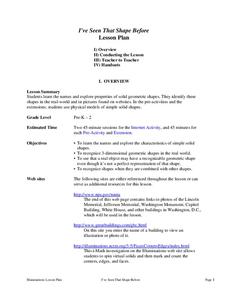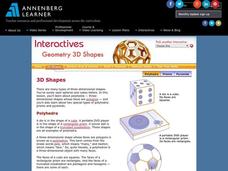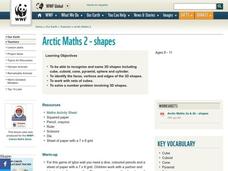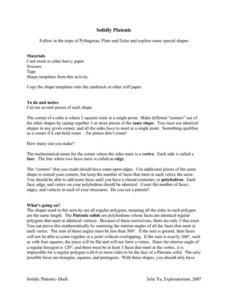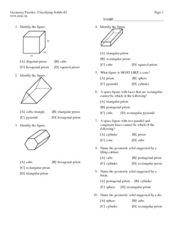Learner
Solid Shapes
A collection of two lessons, kindergartners will identify two-dimensional shapes in solid shapes. They will develop basic knowledge of the components that make up a sphere, rectangular prism, pyramid, cylinder, cone, and cube. Young...
Math Worksheets 4 Kids
Sorting 2-D and 3-D Shapes
Challenge mathematicians to examine and sort a variety of 2-D and 3-D figures with a 10-problem solid shapes worksheet.
Granite School District
Kindergarten CCSS Math Vocabulary Word List
Help kindergartners develop the academic language they need to master the Common Core standards with this list of math vocabulary. Including the definitions of each term as well as a set of word cards with supporting images and examples,...
Mathed Up!
2D and 3D Shapes
What a great assessment to give young mathematicians in order to test their knowledge on two- and three-dimensional shapes. Learners name various shapes, identify the number of edges, faces, and vertices, match an unfolded version of a...
World Wildlife Fund
Arctic Shapes
In a two-part worksheet, young geometers examine 3-D shapes and describe their attributes in a table. They will be able to draw the shape and name the number of vertices, faces, and edges. In the second part, individuals explore...
Curated OER
Solid Shapes
For this geometric solids worksheet, students examine 4 different solid shapes then record the number of faces, the number of edges and the name of each shape.
Fayetteville Public Schools
I've Seen That Shape Before
The objectives in the resource allow students to explore the characteristics of simple solid shapes. Youngsters learn to recognize the face shapes, corners, and edges that make up 3-D figures by filling in a chart. Lastly,...
Annenberg Foundation
Geometry 3D Shapes: 3D Shapes
Explore vocabulary related to three-dimensional shapes. An instructional website describes the characteristics of different geometric solids. Learners can use an interactive component to view nets, faces, vertices, and edges of common...
World Wildlife Fund
Shapes
Investigate the properties of three-dimensional figures with this Arctic-themed math lesson plan. Beginning with a class discussion about different types of solid figures present in the classroom, young mathematicians are then given a...
Resources for Educators
Math & Science Connection
Whether you're using a collection of Dr. Seuss books to teach basic math skills like counting, adding, and subtracting, or exploring the different states of matter by melting a crayon with a hairdryer, a series...
Curated OER
Solidly Platonic
When they do, they learn. Using this resource, young mathematicians learn about platonic solids by actually building, touching, and examining the shapes. They connect their observations about the shapes to Euler's formula.
Super Teacher Worksheets
Solid Figures
In the hustle and bustle of everyday life it's easy to forget that geometric shapes are everywhere in the world around us. As they complete this shape identification worksheet, young mathematicians realize that many common real-life...
Illustrative Mathematics
3-D Shape Sort
From the apple on your desk and the coffee cup in your hand, to the cabinets along the classroom wall, basic three-dimensional shapes are found everywhere in the world around us. Introduce young mathematicians to the these common figures...
Curated OER
Geometry Practice: Classifying Solids #2
In this solids worksheet, students identify the characteristics of solids. They name solids and determine the number of faces. This three-page worksheet contains seventeen problems. Answers are listed on the last page.
Kuta Software
Identifying Solid Figures
Reinforce basic geometry skills in an elementary math lesson. A simple worksheet prompts learners to identify and label 3-D shapes.
Curated OER
Geometric Shapes, Construction Perspective
Learners examine three different geometric solid shapes and their nets. They answer multiple choice, spatial awareness questions where they determine which view: front, top or either, the net represents.
Curated OER
Solid Shapes
In this solid shapes worksheet, students count and name shapes, write the names of missing shapes, write about the difference between a rectangular prism and cube and build designs.
Math Worksheets 4 Kids
Solid Nets: With Tabs
Get in shape with a series of worksheets about making 3-D geometric shapes. Learners use the example at the top of the page to model their shapes, which range from a simple cube or cone to a more complicated octagonal pyramid.
North Carolina State University
Shapes
Expose youngsters to 3-D objects in a hands-on learning activity involving marshmallows and toothpicks. Engage your young mathematicians by introducing them to 3-D shapes by means of a story book. Explore 3-D shapes by manipulating...
EEWeb
Geometry: Shapes and Solids
An excellent resource for a geometry class, as well as for an electrical engineering course. A thorough reference sheet covers geometric shapes such as triangles, parallelograms, and circles, as well as 3-D shapes and the Pythagorean...
Curated OER
Shape Hunt
Students explore two-dimensional and solid shapes. In this shapes and patterns geometry lesson, students work with a partner to create identifiable objects using tangrams. Students describe the attributes of their shape and their partner...
Scholastic
Study Jams! Solid Figures
Figure out the correct name for different three-dimensional shapes by watching the presentation on solid figures. Go through the main figures and read about the characteristics of each. Finish the topic with a multiple choice online...
Houghton Mifflin Harcourt
Unit 6 Math Vocabulary Cards (Grade 4)
In need of math vocabulary cards? Use a set of 66 vocabulary cards with topics focused mostly on geometry terms. Each sheet has two cards on it. The top half has the word printed in bold text, while the bottom half has the card with...
Curated OER
Volume of Solids: Algebra/Geometry Institute
Use this volume of solids lesson to have learners find the surface area and volume of cylinders, pyramids, and prisms. They place cubes inside three-dimensional figures to determine the volume. Worksheets and answers are provided.








